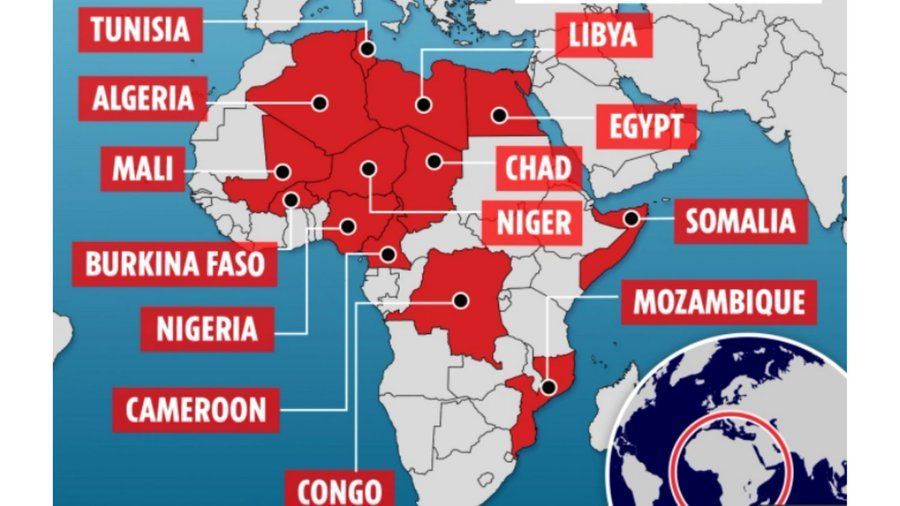ISIS Strengthening Its Foothold In Central Africa

After two suicide bombers detonated explosives in the Ugandan capital of Kampala, at least four people are said to have been killed and more than 30 others injured. The plumes of smoke which clouded the chaos on the 16th of November are now beginning to settle, as jihadist group Islamic State claim responsibility.
Security forces in Uganda have since reported that a Muslim cleric linked to the suicide bombings has been shot dead. Officials accused Sheikh Muhammad Abas Kirevu of having recruited for cells run by the Islamist militant group known as the Allied Democratic Forces (ADF) – a group of rebels who have pledged allegiance to Islamic State (IS) since 2019.
The U.S. embassy in Kampala had warned of “the ongoing possibility of more terrorist attacks in Uganda” three weeks ago, but no extraordinary precautions were taken and now police and peacemakers are playing catch up. Since Tuesday’s attack, twenty-one people have been arrested, in what police have described as the dismantling of ADF terrorist cells in Kampala and across the country.
See also
#LongRead ISIS in Africa: Can the Spread of Religious Extremism be Stopped? https://t.co/K1b1Ql1JYh
— Jasusi (@Chahali) October 29, 2021
Police spokesperson Fred Enanga said thirteen suspects, including several children, were detained whilst trying to cross the border into the Democratic Republic of Congo, where many rebel groups are able to roam free because of a lack of strong government and mistrust in military intervention.
A manhunt is also under way for another cleric, Sheikh Suleiman Nsubuga, who is accused of training terrorists, radicalising potential recruits, and providing materials to make improvised explosive devices.
The ADF, formed in Uganda in the 1990s, is now based in the Democratic Republic of Congo. The group has long been opposed to the rule of Ugandan President Yoweri Museveni, a U.S. security ally who was the first African leader to deploy peacekeepers in Somalia, with the hope of protecting the federal government from al-Shabaab, a jihadist fundamentalist group.
Related news

In retaliation to Uganda’s deployment of troops to Somalia, as well as frustrated by a feeling that Muslims have been side-lined by Museveni’s policies, ADF carried out attacks in 2010 that killed at least 70 civilians who had gathered in Kampala to watch a football game. Following this, a Ugandan military assault later forced the rebels into Eastern Congo.
Since the emergence of IS in Democratic Republic of Congo and Uganda, the frequency of terrorist attacks has increased significantly. In its propaganda, IS has frequently singled out Christians and taunted the DR Congo government over its “failure” to protect them from its attacks. Given that DR Congo and Uganda are predominantly Roman Catholic, (with Muslims comprising only about 10% of the population) this is particularly concerning.
Such provocation, however, is characteristic of IS, often seeking to exacerbate local tensions to bolster its credentials as the saviours of ordinary Muslims against “oppression,” manipulating emotions through shared ideology.
According to the UN’s refugee agency, the UNHCR, the ADF, under IS directive, has killed about 200 civilians and displaced nearly 40,000 others in Beni, DR Congo, since January 2021, as well as targeting government and UN troops.
Perhaps most concerning here is that IS, forever thirsty for violence and terror, is perfectly placed to exploit the heightened tensions in the region and expand activity into neighbouring countries. Indeed, this is already in evidence, with increased attacks in Mozambique and the first IS-claimed attack in Tanzania in October last year, which reportedly left 20 soldiers dead.
This expansion is part of a general tilt towards Africa following IS’s recent setbacks in its Middle Eastern heartlands. If nothing is done to placate the anger and ease hostilities however, it is unlikely that this will be the end of the ADF’s attacks. Instead, this may just be the incipience of a number of coordinated attacks in Kampala and further afield, something that threatens peace not only in Uganda, but across the whole of Africa.

